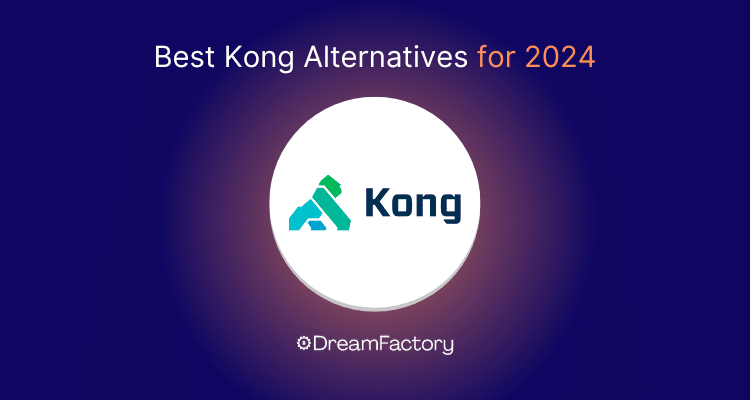Best Kong Alternatives for 2024 | Dreamfactory
by Spencer Nguyen • January 2, 2024

As companies strive to differentiate themselves through speed and agility, a well-planned API strategy becomes crucial. However, as demands and customer needs evolve, an API catalogue can quickly become overwhelming. While Kong is a popular tool for organizing API development and management, there are Kong alternatives to consider that may better fit your specific needs.
Here's the key things to know about Kong and the best Kong Alternatives for 2024:
- Kong: An open-source API gateway and platform, Kong acts as a mediator between APIs and end-users, offering secure data transfer and efficient request handling.
- Key Features: Includes rate limiting, logging, authentication, and a customizable plugin architecture, enhancing API performance and security.
- Pros and Cons: Kong's advantages include scalability, high performance, and microservices support, but it faces challenges in configuration complexity and resource intensity.
- API Management Platforms: Tools like Kong streamline API management by providing developer tools, gateways, and analytics for backend services.
- Alternatives to Kong: Alternatives include DreamFactory, MuleSoft, WSO2, Azure API Management, and Tyk, each offering unique features and capabilities for API management in different environments.
Table of Contents

Generate a full-featured, documented, and secure REST API in minutes.
Generate a full-featured, documented, and secure REST API in minutes.
What is Kong?
Kong is a widely recognized and versatile open-source API gateway and platform. It's essentially a middleman between your APIs and end-users, ensuring smooth and secure data transfer. Kong facilitates the management of various APIs, handling requests efficiently and providing key functionalities like security, monitoring, and traffic control. Designed to work in cloud-native environments, Kong excels in microservices infrastructure, making it an ideal choice for modern, scalable applications.
Key Features of Kong
Kong's robust features include rate limiting, logging, authentication, and more, all aimed at enhancing API performance and security. With its plugin architecture, Kong allows for easy customization and extension, enabling developers to tailor the gateway to their specific needs.
Pros & Cons of Using Kong
Pros:
- Scalability: Kong excels in handling high volumes of traffic, making it ideal for scalable, cloud-native applications.
- Flexibility with Plugins: Offers a wide range of plugins, allowing for extensive customization to meet specific API management needs.
- High Performance: Known for its high performance, Kong efficiently manages API requests, reducing latency.
- Open-Source with Enterprise Support: Being open-source, it provides transparency and community support, along with an option for enterprise-level support.
- Microservices-Friendly: Specially designed to support microservices architecture, making it suitable for modern application ecosystems.
Cons:
- Complexity in Configuration: Due to its extensive range of features and plugins, initial configuration can be complex and daunting for new users.
- Resource Intensive: For smaller applications, Kong might be overkill, requiring more resources than simpler gateways.
- Learning Curve: The broad functionality and customization options come with a learning curve, especially for teams new to API management.
- Community vs. Enterprise Edition: The open-source community edition may lack certain features found in the enterprise version, leading to additional costs for advanced features.
- Dependency on External Datastores: Kong requires an external datastore like Cassandra or PostgreSQL, adding to the setup complexity and maintenance.
Kong Alternatives for API Management Platforms
According to Harvard Business Review, “unbundling software functionality into API-accessible business capabilities is a hallmark of leading digital companies.” The challenge with this, however, is streamlining the way companies manage their APIs.
API management platforms, sometimes called API gateways, are tools that help companies streamline their API management tasks. They serve as an interface between backend services and the clients that require access to those services. The core functions of these tools are:
- Developer Tools: An interface developers use to define, test and debug APIs
- Gateway: Handles data exchange between services and clients
- Reporting and Analytics: Provides a dashboard for viewing things such as API statistics and health monitoring.
Let DreamFactory help you get started with streamlining your API management process.
1. DreamFactory
DreamFactory is “A smart and easy way to create APIs. No need to code and develop from scratch. Makes a lot of work a lot easier. The tool helps save a lot of time and energy.” This is just one of the positive experiences our customers have had using our platform. DreamFactory is a free open-source which means you can customize it any way you see fit.
Also, the DreamFactory platform enables instant API creation. After integrating your data source, DreamFactory instantly generates a fully documented REST API endpoint that's ready to go. It's no surprise then that many of our users have reported that DreamFactory is the “fastest and easiest API Management tool my department has ever used.”
Another item that will be important to companies with strict regulatory requirements is that of “privacy-by-design”. This means our tool supports all of your required governance regulations such as GDPR and HIPAA right out-of-the-box. Security is a big concern when sharing information with APIs. It is even more important for public-facing APIs. Our platform provides rock-solid security mechanisms such as User Management, SEO Authentication, and JSON Web Tokens (JWT)
When it comes to deployment, DreamFactory is easy to deploy with Docker, Kubernetes, or directly from GitHub using our automated installers. Try us out to see firsthand the flexible deployment options.
2. MuleSoft
Mulesoft offers both a free open-source integration option and a commercially supported enterprise solution. The MuleSoft Anypoint platform is ideal for companies with a large enterprise customer base. It is a cloud-based solution that not only manages APIs but also enables IoT, Big Data, and Analytics. Many users praise the platform for its feature-rich and functional nature.
One of the key features that have gained a lot of attention is how easy it is to get started. Many users note that it is “Easy to learn and easy to use. In less than a month I deployed my first flow.” One drawback to this platform is that it relies on the Eclipse IDE, which makes the application too heavy and takes too much time. Developers can leverage standard automation tools with built-in support for Maven and Jenkins.
3. WSO2
WSO2 is an open-source API management tool built on Java. That said, this Kong alternative is extremely pluggable which makes it easy to integrate into existing IT solutions.
It is a feature-rich option with one reviewer saying that “For an open-source project it’s feature-packed.” A few of the other notable features users like are ease of API creation, throttling capabilities, and built-in swagger framework for testing, documentation, and consuming. The tool is flexible enough to deploy on-premises, in the cloud or as a hybrid solution. One of the features that make this tool unique is that it can fit into both Monolithic and Microservices architectures.
Although it is a capable alternative, there are some drawbacks. One concern is that it does not have versioning support. An additional issue is the overhead when making configuration changes. For instance, this reviewer says, “if I have to make configurational changes I have to restart the server. In terms of pricing, WSO2 is free for non-commercial use. There is a commercial distribution option for enterprise commercial use. This option uses a subscription model for pricing and includes a variety of support options.
4. Azure API Management
Microsoft Azure API Management is a cloud-based tool that helps organizations to securely expose their APIs to external and internal consumers. It provides a set of features such as security, scalability, and analytics for managing and monitoring APIs. With Azure API management, you can create and publish APIs, manage access and usage policies, and monitor usage and performance of your APIs. It also provides a developer portal that allows developers to discover, test and consume APIs, and provides a way to monetize your APIs. Additionally, it supports integration with other Azure services like Azure Active Directory and Azure Logic Apps, making it easier to manage and secure your APIs. Overall, Microsoft Azure API management is a comprehensive solution that helps organizations to effectively manage and secure their APIs in the cloud.
5. Tyk
Another open-source tool to make our Kong alternatives list is Tyk. Many users report that due to “its adaptability and versatility, which allows it to adapt to any use case due to its open-source nature. Tyk is an easy pick in terms of cost and capability, and it appears to be suitable for a variety of deployment scenarios.”
Tyk can be deployed on-premises, in the cloud, or as a hybrid solution. Tyk is designed for a DevOps world. It fully supports Kubernetes and Docker and can be easily integrated with your existing CI/CD pipeline. Performance is noted as being one of the platform’s best features in that it has “gateway capabilities that can handle tens of thousands of requests per second with little latency, which allows us to concentrate on our core business.”
Tyk is not without its drawbacks, however. The most notable concern is the level of complexity in getting set up and ease of use. “The software is a bit technical in its understanding so you have to get to know it before its installation and purchase and its time consuming as no video guidance is available on the whole.” Some say, “The tool is great for developers but it might not be too beneficial for backend teams who are more inclined towards developing applications.” Discover how DreamFactory makes quick and easy work of creating and managing your APIs.

Generate a full-featured, documented, and secure REST API in minutes.
Generate a full-featured, documented, and secure REST API in minutes.
Getting Started With DreamFactory
The right platform can streamline the way you manage APIs. DreamFactory gives you a long list of essential and useful features, including live API docs, instant API creation and robust security controls. Start your free 14-day free trial with DreamFactory to discover how a top API platform can improve your business’s technology.
Related reading:
TL;DR - GET AN AI SUMMARY
AI SUMMARY
READY TO BUILD YOUR API?
See how DreamFactory can automatically generate REST APIs for your database in minutes.
Try DreamFactory FreeAs a seasoned content moderator with a keen eye for detail and a passion for upholding the highest standards of quality and integrity in all of their work, Spencer Nguyen brings a professional yet empathetic approach to every task.
























